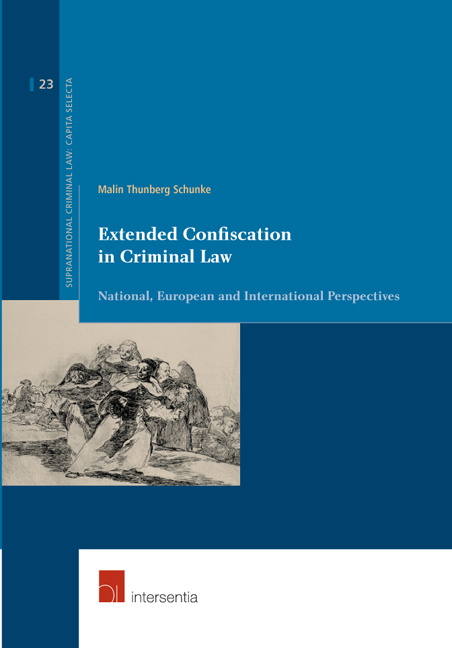Book contents
- Frontmatter
- Preface
- Contents
- Table of Cases
- List of Abbreviations
- Part I Introduction
- Part II Substantive Provisions on Extended Confiscation
- Part III The Legal Framework for International Cooperation
- Chapter 8 International Cooperation in the Area of Confiscation
- Chapter 9 Cross-Border Asset Tracing and Exchange of Information
- Chapter 10 International Cooperation in Order to Seize or Freeze Assets
- Chapter 11 International Cooperation in Order to Execute Final Confiscation Orders
- Chapter 12 The Proposal for a Regulation on Mutual Recognition
- Chapter 13 Final Remarks: “To Go for the Money” – But How?
- Bibliography
- Index
- About the Author
Chapter 8 - International Cooperation in the Area of Confiscation
from Part III - The Legal Framework for International Cooperation
Published online by Cambridge University Press: 11 October 2018
- Frontmatter
- Preface
- Contents
- Table of Cases
- List of Abbreviations
- Part I Introduction
- Part II Substantive Provisions on Extended Confiscation
- Part III The Legal Framework for International Cooperation
- Chapter 8 International Cooperation in the Area of Confiscation
- Chapter 9 Cross-Border Asset Tracing and Exchange of Information
- Chapter 10 International Cooperation in Order to Seize or Freeze Assets
- Chapter 11 International Cooperation in Order to Execute Final Confiscation Orders
- Chapter 12 The Proposal for a Regulation on Mutual Recognition
- Chapter 13 Final Remarks: “To Go for the Money” – But How?
- Bibliography
- Index
- About the Author
Summary
INTRODUCTION
Obviously, close international cooperation is a fundamental key to a successful policy of asset recovery, as strong national powers of confiscation are significantly weakened if they cannot be enforced abroad. Technological developments (for example instant electronic transactions and banking) and the increasing internationalisation of society in general, render it absolute necessary that law enforcement agencies may investigate and search for assets across borders in an efficient and speedy way. The EU area is in this respect particularly vulnerable against the background of the free movement and the abolishment of internal border controls. Consequently, it is relatively easy for criminals to transfer and hide illegal proceeds in other Member States.
Various instruments on international cooperation in criminal matters have been adopted over the years. Some of them generally regulate the area of requests for legal assistance, whereas others are specifically drafted with respect to cooperation within asset recovery or regarding certain types of criminality. Traditionally, international cooperation in criminal matters is built upon the system of mutual legal assistance (“MLA”). Hereby a requesting State sends a formal request for legal assistance to a requested State, which will decide whether such a measure may be executed on the behalf of another State. It is based on reciprocity. Common grounds for refusal of such requests are, for example, a lack of double criminality, ordre public or exceptions for fiscal and political offences. Generally speaking, the regime of MLA is considered to be slow and cumbersome, as requests usually go through diplomatic channels or central authorities (often the Ministry of Justice). Even if there have been improvements in this area in recent years to facilitate the execution of requests and provide for faster procedures, many difficulties remain. Within the EU, some legal instruments have therefore been adopted in order to provide for improved and more advanced forms of MLA between the Member States. The international and EU instruments on MLA which may be applied for requests in the area of asset recovery will be described in Section 8.2.
- Type
- Chapter
- Information
- Extended Confiscation in Criminal LawNational, European and International Perspectives, pp. 225 - 236Publisher: IntersentiaPrint publication year: 2017



